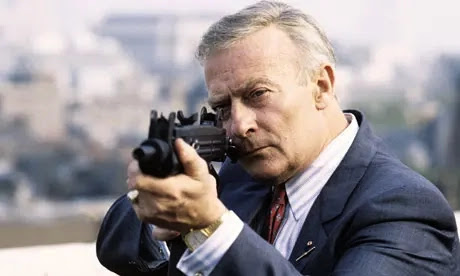‘THE EQUALIZER’ SERIES 2.
McCalls’ character continues to deepen, mining the territory – familiar to Callan viewers – of a man disgusted with a profession he’s exemplary in but is so weary of: “Too many battles, too many bloody wars.”
‘Prelude’, the first episode, is notable for featuring a barbaric regime McCall brought to power in a coup when he worked for “the agency”, a situation which prompts an awkward ethical conversation with his son, Scott (William Zabka). By contrast, though, by now there’s a simple moral mechanism in play in the action scenes: in a gunfight, McCall usually asks the bad guys to surrender and, when they don’t, he shoots them down, effectively making their deaths their own responsibility.
Callan, on the other hand, never fought fair – sometimes shooting people in the back, when they were unarmed, or even when they were already seriously wounded. It’s hard to imagine that kind of ruthlessness making it on to American network television in the 1980s. Significantly, in ‘Nightscape’, McCall’s shooting of three rapists occurs off-screen, most likely because they threaten him with flick knives – a very unequal show of arms.
In the second series, the format begins to stretch a little. In ‘Shades of Darkness’, McCall takes on a cowardly mercenary, Dillon (Rick Sadler), who raped and killed a girl in Vietnam, then betrayed and tortured his comrades. The scene of him hallucinating and firing wildly at his dead army unit is visually striking, reflecting his fragile mental stability breaking down. But were the illusions really ghosts? McCall only fired at Dillon once and missed, but his dead body was riddled with bullets…
In ‘Counterfire’, McCall is set up for murder. “I haven’t been on the run for years. Where the hell do I start?” he tells the reliably shifty Control (Robert Lansing), who’s visibly amused. Having McCall on the back foot gives Woodward some scope to play the vulnerability he’s never normally allowed. Memorably, he uses molotov cocktails to intimidate an arsonist, played by a young but already impressive Vincent D’Onofrio. Again, the implication is that the villains in The Equalizer deserve everything they get.
The moral ambivalence of vigilantes also gets a timely examination. In ‘The Line’ (above), the Citizens’ Patrol kill a black teenager they automatically suspect of being a burglar, then try to cover it up when they report the death to the police. Vigilantes were a real issue in New York in 1986 – the Guardian Angels, established in 1979, were patrolling the city and were opposed by the mayor, Ed Koch. The story portrays the Citizens’ Patrol as racist (although they don’t openly say so) and arrogant, with one of its members seduced by violence. The story is given an extra dimension by the murdered boy’s mother killing one of the Citizens’ Patrol in self-defence, and her other son buying a gun to take revenge, because he believes his mother won’t get a fair trial.
There’s a lovely drunken scene between McCall and a newly divorced Jimmy (Mark Margolis), too. In another scene in ‘The Line’, McCall says to Jimmy, “I’ve got a little job for you,” which is almost exactly what Callan often said to Lonely.
The messages left on McCall’s answerphone continue to be a source of humour, one of the best a confused caller asking the Equalizer to fix his stereo. And this time around McCall has more of a love life, escorting several glamorous middle-aged women to dinner and, sometimes, back to their front doors.
Young children feature a lot less in the stories. That means that the narrative component used to humanise McCall in the first series, namely avuncular, fatherly homilies, isn’t there anymore. Overall, this makes the series more grown up but harsher, the Equaliser’s humanity now arising from his existential musings on the contradictions in his life.
McCalls’ romantic dalliances
are always impeccably chivalrous and well mannered, another contrast with his
violent craft. The two extremes are brought together in ‘Nightscape’, when
McCall confesses to his date that he’s a professional killer. This contrast
between McCall’s opposing facets confirmed in Series Two that The Equalizer had
firmly established its own identity.




Comments
Post a Comment